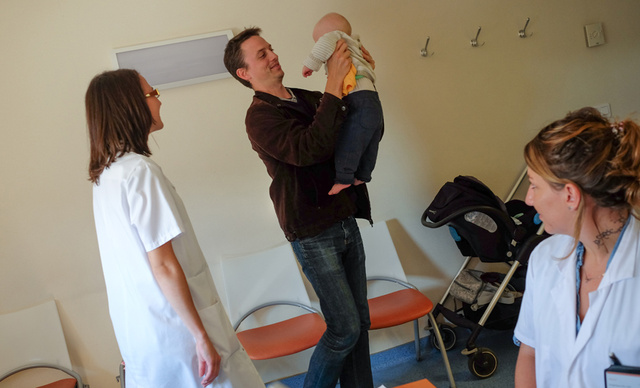Tailored social support for young patients at Institut Curie
The Pediatric and AYA (Adolescents and Young Adults) social services review the situation of young patients and their families and help them to explore their rights and find appropriate solutions. Connections are established with the various organizations so that families can obtain all the social services to which they are entitled.

Dealing with the illness of a child, adolescent or young adult can cause real material, organizational, and professional hardships in people’s day-to-day lives. The Pediatric Oncology social workers are responsible for welcoming, informing, guiding and supporting the families of patients aged up to 14 (Pediatrics) and 15-20 (Adolescents and Young Adults, or AYA). The goal is to assist patients (hospitalized, at the day hospital or in consultation) and their loved ones in finding solutions to difficulties related to the treatment.
The social workers see patients by appointment from Monday through Friday, but can also come to patients’ rooms upon request. “At the first interview with the family, which we meet with systematically, we ensure that the patient is receiving coverage for care (national health insurance and supplemental insurance, parents’ personal insurance, etc.) to cover the costs related to the illness,” explains Sandra Toscani, Pediatric social worker (for children from birth to age 14). “The family situation is examined (including the family’s resources, housing and employment) to achieve a social diagnosis in order to then set up an intervention action plan to finance the patient’s treatment.”
The difficulties faced by young patients and their families may be varied, including both routine expenses (such as rent, utilities, children’s school lunches) and expenses related to the illness (transportation, nights spent at the Maison des parents, meals at the hospital, etc.). The treatment may generate expenses, but may also diminish resources, since the young adult or his/her parents may have to reduce working hours or stop working altogether. “In addition to helping them exercise their rights, the challenge is also to provide young adults with all the opportunities to resume an active life and re-establish their social, professional and educational life,” explains Socorro Flores, a social worker for adolescents and young adults (ages 15 to 25). “The difficulties may involve social or professional reintegration and the return to work, as well as housing problems.”
Social support for implementing solutions appropriate to each situation
As they support patients through the various processes, the social workers are responsible for implementing the various existing social arrangements. For example, the AEEH (education allowance for children with special needs from birth to age 20) and the AAH (allowance for adults with special needs aged 20 and up). To help parents organize new working arrangements during the treatment period, various allowances are available: the AJPP (parental-leave allowance) and the CEP (parental-educational leave), as well as sick leave.
To help them cover the costs generated by the illness, associations are in place to support families: the APAESIC (association of parents and friends of children treated at Institut Curie), Rétinostop, Ligue Contre Le Cancer, the Princess Grace of Monaco Foundation, the Fondation des Hôpitaux de Paris – Hôpitaux de France, and the UNAPECLE (national union of associations for parents of children with cancer or leukemia). Home help charities even offer such services as household help and babysitting.
Families coming from abroad who must remain in France for their child’s treatment may also receive assistance to cover accommodation and transportation costs. The AME (French state medical assistance), an allowance that enables foreign nationals to access health care and the universal health care program (CMU), may also be offered.
